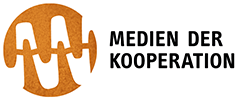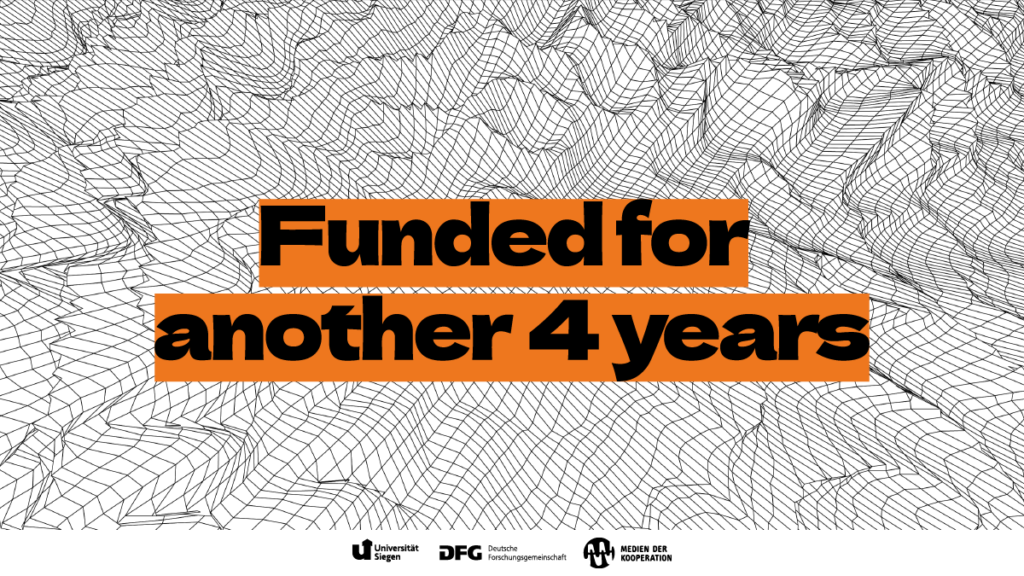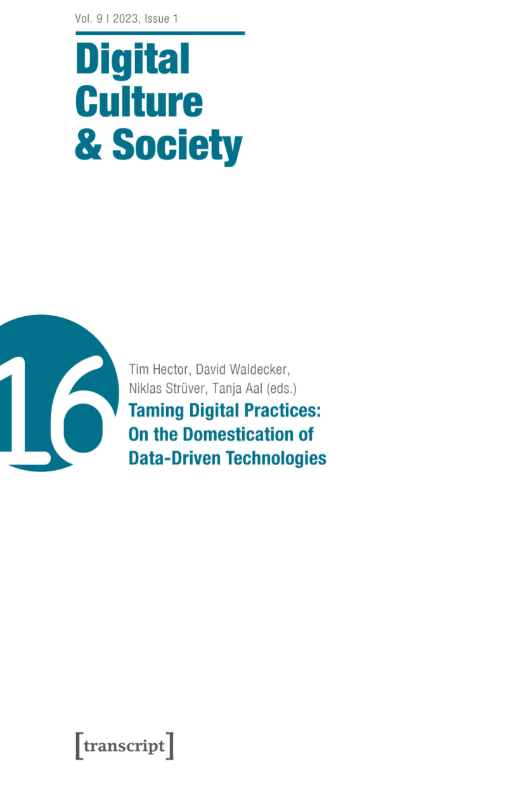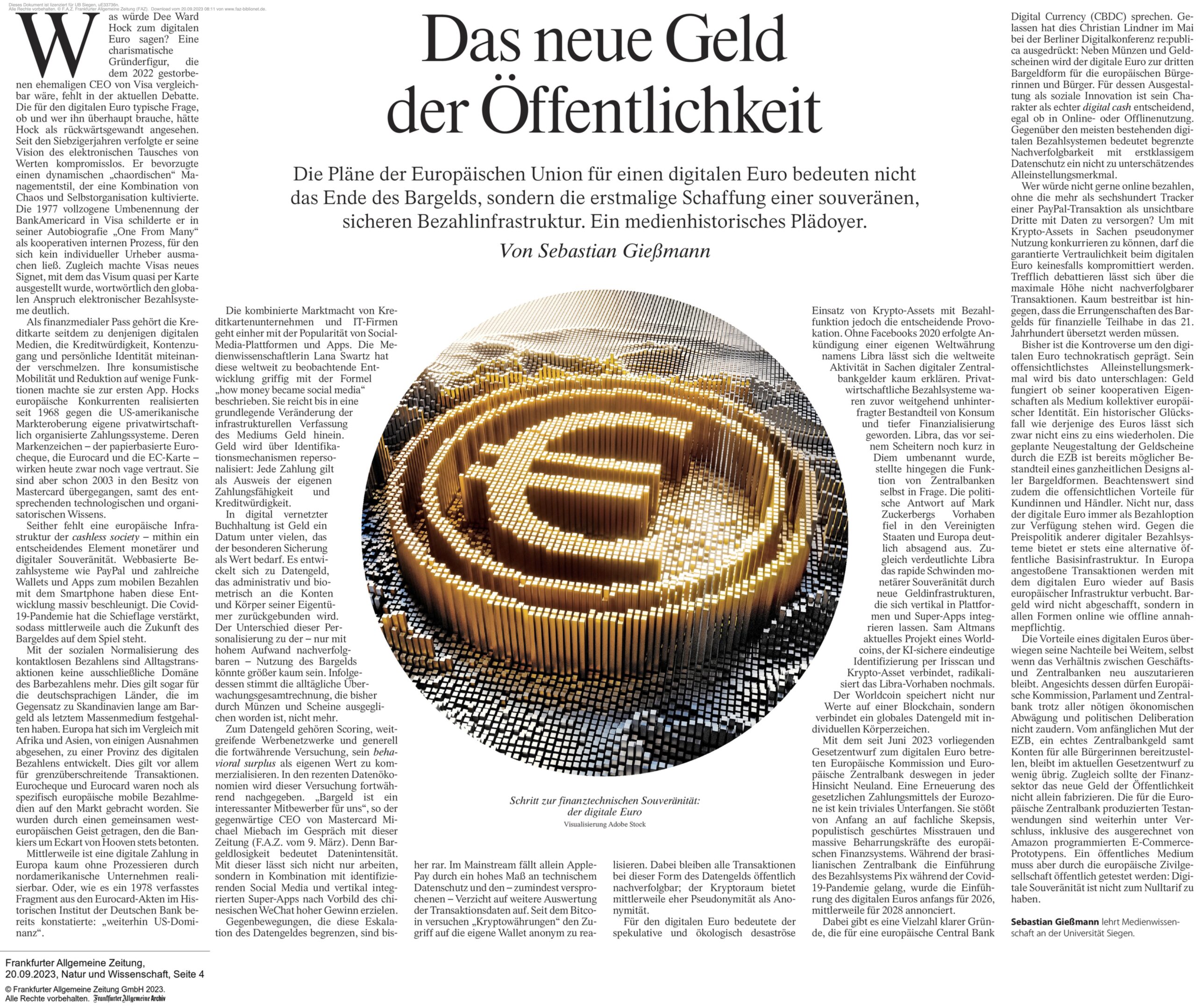News
“En/Countering Tracking: Resisting spatiotemporal media operations in computational culture”
The deadline for submissions is September 15, 2024.
Countering tracking has become a key form of resisting the logics of computational culture. Subversive encounters have emerged in recent years as counterpoints to the hegemonic logics of web infrastructures (Christl and Spiekermann 2016), platform labor (Heiland 2021) and racial capitalism (Russell and De Souza 2023). These attempts to counter tracking take forms that range from investigative visualizations (Fuller and Weizman 2021) or provoking glitches in tracking infrastructures (Leszczynski and Elwood 2022) to uncovering web-based tracking (Sharelab 2015), building counter-infrastructures for labor resistance (Qadri and D’Ignazio 2022), or using sensors and satellite images for critical investigations (Ballinger 2023; Boyd et al. 2018).
Countering tracking becomes a resistant media operation itself, disentangling hegemonic spatiotemporal regimes and their socio-political forces. These forms of countering tracking challenge existing theoretical approaches to the critical analysis of tracking and open up new perspectives on subversion and resistance in computational culture. How is countering tracking by means of tracking possible in different contexts and in relation to software, infrastructures and aesthetics?
We invite critical encounters through and of tracking, enabling new perspectives on computational infrastructures, software, (non-)human aesthetics and operative interactions, by means of theoretical reflections, critical making or activism. We aim at gathering submissions that 1) render existing tracking operations perceivable; 2) disrupt tracking infrastructures; or 3) operationalize tracking itself for resistance. The special issue invites theoretical, conceptual and performative approaches from fields such as media studies, visual studies, artistic research, sociology and critical geography to address the question of how tracking becomes a repressive, subversive or activistic media operation.
Topics and projects might include:
- Inventive methods that repurpose tracking infrastructures, sensors, software and data to research computational culture
- Detailed empirical and critical studies exploring the relations of en/countering tracking in computational culture
- En/countering tracking in labor resistance and platform capitalisms
- Critical theoretical conceptualization of tracking or countering for the study of computational culture
- Critical explorations of the chronopolitics, timescapes and spatiotemporal regimes of tracking
- Activist media, countersurveillance, tactical media, decolonial, (glitch) feminist and resistant epistemologies of tracking
- En/countering relations between political economy, racialized capitalism and tracking
- Visual cultures, (in-)visualities and aesthetics of en/countering tracking
- En/countering tracking in media art and artistic activism
Schedule:
750-word abstracts should be emailed to en_countering_tracking@uni-bonn.de by September 15, 2024. Abstracts will be reviewed by the special issue editors and the Computational Culture editorial board.
Any queries can be addressed to the special issue editors at: en_countering_tracking@uni-bonn.de
Official call for contributions | Call for contributions PDF
“The Datafied Web”:
6th RESAW Conference (5-6 June 2025, Siegen University)
The deadline for submissions is 15 October 2024.
Do you remember the beginnings of early metrics in the 90s, the birth of web counters, those digital pioneers that marked and started to quantify the pulse of online activity, the novelty of seeing website visits measured in real-time, eye-catching graphics becoming the currency of online attention, and the early days of companies like Webtrends, Urchin and DoubleClick?
We invite scholars, researchers, web archivists to contribute to the 6th RESAW conference on the topic of “The Datafied Web”, through a historical lens. We would like to delve into the historical roots, trends, and trajectories that shaped the data-driven paradigm in web development and to examine the genealogies of the datafied and metrified web. Historical studies of trajectories towards a databased web and the emergence of platform-driven mobile ecosystems are very welcome, as well as case studies for instance related to the development of Application Programming Interfaces (APIs) and the evolution of data-sharing practices. Uncovering the early forms of analytics software, their origins, and the role they played in shaping the web landscape, and examining the historical context, aesthetics and role of web counters, analytics tools, mobile sensing and other metrics may also help us deepen our understanding of online interactions, past publics and audiences, and their (uneasy) trajectories. “The datafied web” also raises questions related to methods and (web) archives allowing to research this evolution: what are for instance the challenges and methodologies involved in archiving the metrified and increasingly mobile web, including the back-end infrastructure?
This theme also invites us to trace the historical trajectory of data surveillance and the evolution of data capturing practices on the web. Complementary are issues related to the historical development of tracking mechanisms, cookies, and the creation of digital footprints, as well as the evolution of companies relying on metrics, and the development of financialized web spaces and their implications. By investigating historical controversies and debates surrounding the increasing datafication of the web and uncovering historical instances of innovative data use or resistance practices against the datafication of the web, this conference also aims at reconstructing vivid and key debates that are transversal to the history of the web. How did the datafied web provide for the sensory media environments that we are now living in?
Finally, we wish to discuss innovative research methodologies for uncovering the historical dimensions of the datafied and metrified web, as well as methods that are approaching web archives as data (from an archiving and research perspective) and explore them through distant reading, metadata, seed lists, and other methods. Plus, we want to encourage everyone to think about datafication as a practice of sensing and sense-making that creates, sustains, and undermines media environments.
Theme scope and conference topics of the RESAW Conference
We encourage submissions addressing the conference theme ‘Histories of the Datafied Web’ through the following themes:
Infrastructures
- histories and genealogies of the datafied and metrified web, including its platformization within capitalism(s)
- aesthetics and design of the early metrified web
- the rise of data surveillance and data capture as an industry
- histories of APIs, data-sharing, and advertising technologies
- the rise of web counters, web analytics, and other web metrics
- histories of trackers, cookies, digital footprints, etc.
Publics
- methods and approaches towards audience of the past web
- historical controversies surrounding the datafication and platformization of the web
- histories of uses of data or practices of resistance to datafication and platform economies
- the rise of the financialization of the web, and its political economy
- histories of automation, virality, and popular practices on the web
Archives
- archiving the metrified web and back-end infrastructure of the web
- methodologies for writing histories of the datafied and metrified web
- web archives as data (archiving and documentation, distant reading, use of metadata, seed lists…)
- web archiving data practices and challenges
After the conference, the organizers will invite relevant contributors to participate in a special issue of Internet Histories related to the topic “The Datafied Web”.
Submissions that explore other aspects both within and outside of the general conference theme, are also welcome.
Submissions for the RESAW Conference
The deadline for submissions is 15 October 2024.
Submissions are welcome from all fields and disciplines, and we would particularly encourage postgraduate students and early career researchers to participate. We also encourage contributions that highlight non-Western and non-hegemonic developments. Contributions on practical challenges of web archiving in current moments of crisis are also very welcome.
Possible formats
- Individual papers of 15 minutes (500-word abstract).
- Panel sessions consisting of three individual papers of 15 minutes, introduced by a chair (500-word abstract for each paper, a brief 300-word description of the purpose of the panel).
- Other unconventional proposals like sessions of lightning talks, roundtables, etc., are welcome (300-word abstract).
- A session “My PhD in 5 Minutes” is foreseen (please apply by providing a 300-word abstract).
Acceptance of submissions is based on double-blind peer review.
Possible formats for the pre-conference day
- Submissions related to web archives are welcome from all fields and disciplines, and we would particularly encourage workshops related to tools, hands-on, as well as training sessions and demos.
- A whole pre-conference (500-word abstract)
- Workshops, demos and other formats related to web archives practices, methods, tools, demos (500-word abstract, specifying the expected duration)
Submissions
The deadline for submissions (including the pre-conference day) is 15th October 2024.
To submit a proposal :
https://easychair.org/conferences/?conf=resaw2025
Timetable
- 15 October 2024: Deadline for submissions
- 15 December 2024: Notifications of acceptance
- 25 January 2025: Programme
- March 2025: Registrations open (fees: 90 euros for advanced scholars, 50 euros for PhD students)
- 4 June 2025: Pre-conferences and demos
- 5-6 June 2025: Conference at Siegen University
The RESAW conference is organized by the CRC 1187 Media of Cooperation in collaboration with the RESAW Conference Committee
The conference is funded in part, by Deutsche Forschungsgemeinschaft (DFG) – Projektnummer 262.513.311 – SFB 1187 Medien der Kooperation and in part by the Luxembourg National Research Fund (FNR), [INTER/DFG/23/17960744/DIGMEDIA].
In der neusten Publikation “Kontrapunkte setzen – Digitale Politische Bildung mit ContraPoints” in unserer Working Paper Series (No. 35, Dez) setzt sich Julia Bee mit den Potenzialen kreativer Format Politischer Bildung in digitalen Kontexten auseinander. Im Zentrum stehen videoessayistische Gegenformaten von Stiftungen, Institutionen und Vlogger:innen, die darauf abzielen, rechte Metapolitiken zu entlarven und zu erkennen. Sie produzieren Bildungsformate, die nicht nur inhaltlich und informativ, sondern auch ästhetisch und affektiv anknüpfen.
Stiftungen, Institutionen und Vlogger:innen haben in den letzten Jahren angesichts des Rechtsrucks auf Plattformen neue Formate der Politischen Bildung geschaffen. Diese wollen präventiv und intervenierend in rechte Diskurse, Trolling, Fake News und Co. eingreifen. Am Beispiel des Youtube-Kanals ContraPoints untersucht Bee die Formatspezifik der politischen Bildung, die im Anschluss an Donna Haraway als situiertes Wissen verstanden wird.
Julia Bee ist Professorin für Medienästhetik an der Universität Siegen. In ihrer Forschung kombiniert sie ästhetische Phänomene mit Medienphilosophie und Praxistheorie. Dekoloniale und Gender Medien Theorie sind dabei zentral. Derzeitige Forschungsgegenstände bilden dokumentarische Filme, TV-Serien, Vlogs, Installationen, Literatur sowie mobile Medienpraktiken wie Fahrradfahren. Sie ist Teilprojektleiterin des ab Januar 2024 neu geförderten Projekts B09 Fahrradmedien: Kooperative Medien der Mobilität.
Die Publikation „Kontrapunkte setzen – Digitale Politische Bildung mit ContraPoints” wird im Rahmen der Working Paper Series des SFB 1187 „Medien der Kooperation“ veröffentlicht. Die Working Paper Serie versammelt aktuelle Beiträge aus dem Umfeld der inter- und transdisziplinären Medienforschung und bietet die Möglichkeit einer schnellen Veröffentlichung und ersten Verbreitung von am SFB laufenden oder ihm nahestehenden Forschungsarbeiten. Ziel der Reihe ist es, die SFB-Forschung einer breiteren Forschungsgemeinschaft zugänglich zu machen. Alle Working Papers sind über die Website zugänglich oder können in gedruckter Form bei info[æt]sfb1187.uni-siegen.de bestellt werden.
The University of Siegen is an interdisciplinary and cosmopolitan university with currently about 18,000 students and a range of subjects from the humanities, social sciences and economics to natural, engineering and life sciences. With over 2,000 employees, we are one of the largest employers in the region and offer a unique environment for teaching, research and further education.
At the University of Siegen, as of 1st of February 2024 (starting date negotiable) the DFG-funded Collaborative Research Center (CRC) 1187 „Media of Cooperation“ offers
Three Short-Term Scholarships for PhD-Candidates
to promote the work of early-carrier researchers. The duration of the scholarships is 9 to 12 months. A longer-term collaboration with the goal of a doctorate within the CRC is envisaged. The basic amount of the scholarship is based on the maximum rate of the DFG (1.365,- EUR). In addition, an allowance for material expenses and, if applicable, a child allowance will be paid.
CRC 1187 “Media of Cooperation“
The CRC is an interdisciplinary research network consisting of 15 projects and more than 60 scientists from the fields of media studies, science and technology studies, ethnology, sociology, linguistics and literature studies, computer science as well as history, education and engineering. It has been funded by the DFG since 2016. The CRC investigates the emergence and dissemination of digitally networked, data-intensive media and understands these as cooperatively accomplished conditions for cooperation. The research of the participating subprojects focuses on data practices and sensory practices that are explored in the situated interplay of media practices, infrastructures and public spheres.
The short-term fellowship program of the CRC provides national and international doctoral students the opportunity to further develop their research project in the CRC, to get to know participating researchers and to exchange ideas with them. The research projects of the scholarship holders should be thematically related to the subprojects of the CRC, so that their work can be supported by the principal investigators and their teams. Scholarship holders are assigned to the Integrated Research Training Group (MGK) of the CRC and benefit from its structured training program. The CRC offers scholarship holders an international environment for interdisciplinary media research as well as an extensive program of events and training in ethnographic, digital, sensor-based and linguistic methods.
Further information on the CRC’s research agenda and subprojects can be found at https://www.mediacoop.uni-siegen.de/en.
Your Profile
- Relevant, above-average degree in one of the disciplines participating in or related to the CRC, preferably in media and cultural studies, sociology or in the field of socio- or business informatics, human-computer interaction or information systems (equivalent to a Master’s degree, Magister, Diplom or Lehramt/Staatsexamen Sek. II)
- Individual research project in one of the above-mentioned disciplines within the subject area of the CRC. Ideally, you can assign the project to one of the subareas of the CRC –
infrastructures, publics or praxeology - Interest in methods of media research, the analysis of data practices and an affinity for working in an interdisciplinary research environment
- Willingness to participate in the international event program of the CRC and the MGK
- Very good written and spoken English language skills
Your Tasks
Expectations of successful candidates:
- Regular participation and involvement in the events and the training program of the MGK (colloquia, workshops, summer schools, methodology workshops, interdisciplinary groups)
- Presentation of preliminary results of the individual research project within the MGK colloquium
Equal opportunities and diversity are promoted and actively practiced at the University of Siegen. Applications from women are highly welcome and will be given special consideration in accordance with the federal state equality law. We also welcome applications from people with different personal, social and cultural backgrounds, people with disabilities and those of equal status.
For further information contact Dr. Johannes Schick
E-Mail: johannes.schick[æt]uni-siegen.de
Please send your application documents (letter of motivation, curriculum vitae, copies of certificates, 5-page outline of a project idea) by 31st of December 2023 to Johannes Schick, Herrengarten 3, 57072 Siegen, Germany. Alternatively, you can also send your application in a single PDF file by e-mail (max. 5 MB) to johannes.schick[æt]uni-siegen.de. Please note that risks to confidentiality and unauthorized access by third parties cannot be ruled out when communicating by unencrypted e-mail.
Information about the University of Siegen can be found on our homepage: www.uni-siegen.de.
The DFG has decided: Our CRC 1187 “Media of Cooperation” has been granted funding for another 4 years, starting January 2024! We are delighted about the DFG’s decision and thank our excellent team of researchers for all the work put into the CRC, the application, the on-site review, the team building, and the fantastic research program. It was a collective effort!
We are also excited to welcome the new projects and PIs, and look forward to shaping more years of research on media of cooperation together, including a future focus on sensory media, artificial intelligence, and sensory praxeology.
Let’s continue the collective work on media of cooperation!
Click here for the university’s press release (in German).
Click here for the DFG press release.
The new publication, “Co-Teaching Post-digital Ethnography” of our Working Paper Series (No. 34, Oct), is out now. The authors, Simone Pfeifer and Suzana Jovicic, deal with teaching complex theories and methodological approaches. They reflect on the co-teaching methods used in a master class on post-digital ethnographies. This work also aims to present implementation examples in teaching and co-teaching constellations using teaching exercises.
Simone Pfeifer is a social and cultural anthropologist focusing on visual anthropology, digital and media anthropology. She is a postdoctoral researcher in the Graduiertenkolleg, and her research focuses on Muslims’ everyday lives and digital media practices in Germany. Previously, she was a research assistant at the Institute of Anthropology and African Studies at JGU Mainz in the research project “Jihadism on the Internet: The shaping of images and videos, their appropriation and dissemination” and at the graduate college “Locating Media” at the University of Siegen.
Suzana Jovicic is a lecturer and ESPRIT (FWF) Fellow at the Department of Social and Cultural Anthropology, University of Vienna. She specialises in digital, design and psychological anthropology, as well as in participatory and interdisciplinary research. She is a co-convenor of the European Network for Psychological Anthropology and a co-founder of the Digital Ethnography Initiative. Website: https://ksa.univie.ac.at/institut/mitarbeiterinnen/post-docs/jovicic-suzana.
The paper “Co-Teaching Post-digital Ethnography” is published as part of the Working Paper Series of the CRC 1187, which promotes inter- and transdisciplinary media research and provides an avenue for rapid publication and dissemination of ongoing research located at or associated with the CRC. The series aims to circulate in-progress research to the wider community beyond the CRC. All Working Papers are accessible via the website or can be ordered in print by email to: info[æt]sfb1187.uni-siegen.de.
Whether it’s a dog, a cat, or a smart speaker, all of them require some time to settle into households. Modern mundane life is brimming with a variety of new data-driven technologies: digitally connected media such as vacuum robots, smart speakers, drones, and kitchen appliances are supposed to augment the practices they are involved in. As people integrate these technologies into their lives through a process of domestication, they adapt to them and are influenced by their presence. The thematic issue “Taming Digital Practices. On the Domestication of Data-Driven Technologies” of Digital Culture & Society, edited by Tim Hector, David Waldecker, Niklas Strüver, and Tanja Aal combines domestication research with empirical analysis of current digital and interconnected media, focusing on the process of taming with an emphasis on practices. In doing so, the issue brings together interdisciplinary perspectives, including media studies, sociology, anthropology, and human-computer interaction, among them a number of contributions from the CRC Media of Cooperation.
Edited by Tim Hector, David Waldecker, Niklas Strüver of the subproject B06 “Un-/desired Observation in Interaction: “Intelligent Personal Assistants” (IPA)“ (IPA)” and Tanja Aal of the subprojetc A05 “The Cooperative Creation of User Autonomy in the Context of the Ageing Society”.
We welcome you back to our new semester and winter program. We already have quite an eventful year behind us with two MGK-colloquia, the annual conference, numerous retreats, rehearsals, a summer school and several guests in our Media Practice Theory series. For the winter term, we look forward to another very appealing and interesting program: The Research Forum features a couple of post-cocs and docs and their projects and a presentation of the GfM Special Issue on „Testing“. We will have two conferences in November and continue our successful Media Practice Theory Series with Jacob Gaboury and Michael Dieter in December. Also, Nina ter Laan, Carla Tiefenbacher and Martin Zillinger organize the hybrid lecture series “60 Minutes Anthropology: Sensing and Sense Making in the Mediterranean”, which will complement the program of the Research Forum.
In the latest publication “Unboxing Spain’s Colonial Past in the Rif – Situating memory work and transborder publics in a Domestic Basement Archive in Madrid” of our Working Paper Series, the author Carla Tiefenbacher analyzes the archival practices of the inhabitants of the northern moroccan city of Al Hoceima. To fully understand the practices surrounding the operation and coercion of colonialism in Spain and northern Morocco, she explores ongoing trans-mediterranean and spanish memory activism by considering collecting practices with the help of the experiences of the inhabitants collected over several changes of power and the preserved objects.
As part of the subproject “Digital Publics and Social Transformations in the Maghreb,” Carla Tiefenbacher currently writes her master’s thesis on archival practices and memory infrastructures among the last Spanish colonizers in northern Morocco. She is currently completing the interdisciplinary course “Culture and Environment in Africa” at the University of Cologne. She holds a B.A. in Liberal Arts and Sciences from the University of Freiburg and is a trained mediator and grief counselor.
The paper “Unboxing Spain’s Colonial Past in the Rif – Situating memory work and transborder publics in a Domestic Basement Archive in Madrid” is published as part of the Working Paper Series of the CRC 1187, which promotes inter- and transdisciplinary media research and provides an avenue for rapid publication and dissemination of ongoing research located at or associated with the CRC. The purpose of the series is to circulate in-progress research to the wider research community beyond the CRC. All Working Papers are accessible via the website or can be ordered in print by sending an email to: info[æt]sfb1187.uni-siegen.de.
Forget crypto! We need a new money for the European public. Sebastian Gießmann, principal investigator of A01, makes a plea for the digital euro on the science pages of the FAZ:





